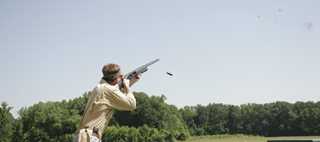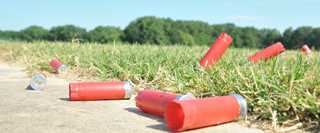Ready on Opening Day
Six tips to prepare for a successful waterfowl opener
Six tips to prepare for a successful waterfowl opener
By Brad Fitzpatrick
It's safe to say that most waterfowlers spend the better part of the off-season looking forward to opening day. We envision a sky black with ducks, imagine them dropping into our decoy spread, and feel ourselves firing the first shot. That anticipation can quickly turn into frustration, however, when we blow that shot. As a former competitive shooter, I know all too well that missing practice means missing targets (or birds). That's why it's important for every serious duck hunter to take time during the off-season to sharpen their shooting skills. Here are six things you can do to get ready for the big day.
Few hunters take time to evaluate their shotgun, but doing so is a simple way to increase your shooting success. The first step is patterning. Begin by gathering targets-you can pay for pre-printed paper targets, but drawing a 30-inch-diameter circle with a large "aiming point" (black dot) in the center works just fine. Take the time to determine how your gun performs at different ranges with various chokes and loads. Practicing at the skeet and sporting clays range will also help you evaluate how well the gun comes to your shoulder. Will it hang up on heavy hunting clothing? Consider a thinner recoil pad. Does it feel comfortable each time you raise it? If your gun comes with shims, you may want to adjust the length of pull and cast for a custom fit.

In fact, break a lot of clays. And do so regularly in the days leading up to the opener. I am a member of a shooting club that offers skeet shooting twice a week, and prior to opening day you'd better believe I'm at the range those days. But while several of my buddies are shooting target over/unders, I'm toting my camo-clad semiauto duck gun. Why? Because that's the gun I'll be carrying into the field. While the basic principles of good shooting apply regardless of the firearm, it's important to practice with the same gun you'll be using in the blind. Shoot some of the same shells you're planning to hunt with as well. A small investment at the range will pay big dividends when those birds are looming over your decoys.
I know a lot of hunters who think they are great shooters without any additional instruction, but if you are serious about sharpening your skills, find someone who really understands shotgun sports and have them evaluate your shot. Chances are, he or she will be able to spot problems you never noticed. Even experienced shooters will benefit from an extra pair of trained eyes and some pointers to help correct minor mistakes before they lead to major misses. Don't have time for one-on-one training? Gil and Vicki Ash's Optimum Shotgun Performance School offers a library of online video tutorials that provide sound advice for improving your shooting skills.

Competitive shooters sometimes call for targets with their gun already mounted, but unless you plan to sit in the blind with a gun on your shoulder all day, you'll need to be prepared to mount and fire in a hurry. Many shots are actually missed before the trigger is pulled, and that's due to incorrect gun mount. Since your eye acts as the rear sight on a shotgun, you must have the gun positioned properly if you want to consistently hit targets. This becomes even more challenging when you're standing in slippery marsh mud and mounting your gun against a thick hunting jacket. That's why it's essential to practice your mount frequently in the weeks leading up to opening day. A low mount may cost you a few targets at the range, but learning to properly, consistently, and quickly mount your gun will help give you more hits when it counts.
Not all ducks will approach your blind at exactly the same speed and angle as a skeet target, so it's important to prepare for a variety of approaches. That's why I throw in a little extra practice with a clay target thrower in my backyard. I prefer to shoot doubles-sometimes 20 or 30 in a row-because it helps me learn to focus on one target at a time. When large flocks come into your spread, the excitement can cause many hunters to shoot wildly, switching from one target to another to try to hit their limit. The result, however, is often misses and cripples. Shooting true pairs (targets thrown at the same time) will help teach your brain to focus entirely on one clay before switching to the next. I also like to play a game called "Chips," wherein I break a single target and then focus on shattering any chips of that target that remain in the air. This trains you to keep your gun on your shoulder after the shot and encourages follow-through-crucial to any shotgunning endeavor.
In most states the dove season opener precedes that of waterfowl, and I can't think of any better way to prepare for successful duck hunting than by spending some time in a dove field. Doves are among the fastest birds, which means they'll expose any weaknesses in your shotgun game in a hurry. Hitting these speedy birds consistently requires smooth gun mount, a hard swing, and consistent follow-through-all key points to becoming a better shot. In addition, high bag limits (15 doves per day in many states) mean more shooting opportunities for relatively little expense. Besides, who doesn't like a dove breast with a little cream cheese and a jalapeño pepper?
Ducks Unlimited uses cookies to enhance your browsing experience, optimize site functionality, analyze traffic, and deliver personalized advertising through third parties. By continuing to use this site, you agree to our use of cookies. View Privacy Policy